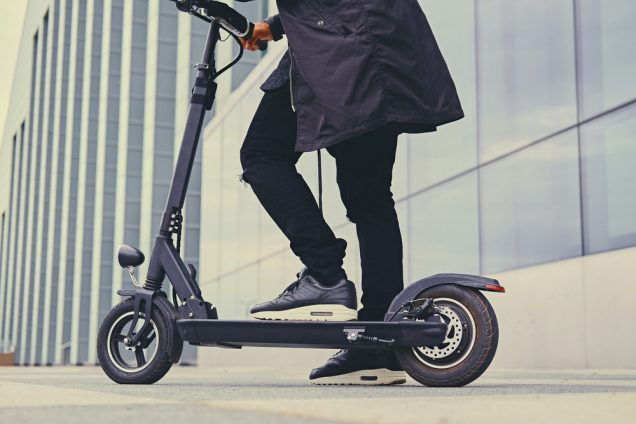Tagged: transportation
Electric Scooters and Data Reporting: A Roadmap to Smart Development
In many cities electric scooters appeared virtually overnight. These new forms of transportation have many benefits including: decreasing carbon emissions, making public transit more accessible, and solving first/last mile issues. Scooters also exacerbate many issues facing urban planners: taking up space on sidewalks, scaring pedestrians, increasing congestion, and may decrease public transit revenues. As state and municipal authorities scramble to regulate this new popular transportation mode, they should also embrace the benefits. A needed first step is to repurpose the Transportation Network Companies (“TNCs”) data reporting requirements to gather similar data from electric scooter companies.
In some cities TNCs, such as Uber and Lyft, contributed roughly 50% to congestion increases in the past several years. As a result, many cities and states have implemented reporting requirements on TNC’s in order to better understand their impact. In February 2019, New York City conditioned operating within the city to the disclosure of ride-share data. Now in New York City, TNCs must report: (1) where each passenger is picked up; (2) the time each passenger is picked up; (3) the total number of passengers; (4) the location where each passenger is dropped off; (5) the time each passenger is dropped off; (6) the total trip mileage; and (7) the cost of the trip. Seattle requires TNC’s to report : (1) the total number of rides provided; (2) percentage of rides completed in each zip code; (3) pick-up and drop-off zip codes; (4) percentage of rides requested but unfulfilled; and (5) collision data.
This data provides many benefits for municipal authorities. First, it allows them to better understand where trips start and end, and at what time the trips are occurring. With this information, authorities can increase and/or decrease existing public transit routes to meet demand, can extend public transit options to reach underserved areas, and adjust infrastructure to facilitate travel trends and tendencies. Public officials argue that when rider needs are better understood and this data put to an effective use, TNCs can be integrated with public transportation systems to make private car ownership obsolete, and vastly reduce traffic congestion. In turn, this would mean more efficient roads and more space for development. Additionally, less traffic would correspond to less damage on existing infrastructure, thereby opening up funding for other projects public transportation.
For example in 2018, Washington D.C., through their TNC data collection, noted that TNC usage matched transit commute patterns closely during the week, but also that TNC usage significantly increased in the evenings and weekends. In 2019, the Washington Metro proposed several potential changes to their operating hours, including significant increases to the number of service hours during nights and weekends. These changes are likely a response to insights gained from TNC data collection.
TNCs and electric scooters are similar in many regards. Electric scooters also provide an alternative transportation option that can either replace or supplement public transit. Electric scooter use can also highlight traffic trends and shed light on infrastructure and public transportation needs. For example, a study of an electric scooter pilot program in Portland, OR noted that 19% of all electric scooter trips occurred between 3 p.m. and 6 p.m. on weekdays, mirroring traditional rush hours. This finding parallels the findings of data collected by Washington D.C. from TNCs.
Because TNCs and electric scooters pose similar problems and could provide similar data, they should be subject to similar reporting requirements. Moreover, these requirements would not be difficult to implement as electric scooters are already GPS tracked and companies already routinely collect the data sought.
Further, this data collection could benefit the electric scooter industry. The Portland pilot program predictably discovered (1) 0% of electric scooters rode on the sidewalk when riding on a street with a neighborhood greenway; (2) 8% of electric scooter users rode on the sidewalk when riding on a street with a protected bike lane; (3) 21% of electric scooter users rode on the side walk when riding on a street with a bike land; and (4) 39% of electric scooter users rode on the sidewalk when riding on a street with no bike facilities. Consequently, Portland could, using this information and additional data about popular scooter routes, construct additional bike lanes in high scooter traffic areas to facilitate a safer commute for riders. Electric scooter data could also help municipalities determine when to increase or decrease public transit availability. If data shows a hotspot for the origination or termination of rides, authorities may even use this data to decide to expand public transit service to a previously unserved area.
Lastly, this data needs to be made available to any interested governmental entity. Although San Francisco has been plagued by TNC congestion the California Public Utilities Commission, which collects TNC data, has been reluctant to share this information with municipalities. San Francisco is unable to make informed policy decisions; regarding both TNCs and public transit generally, without this information. This hoarding of information must not happen with the data collected from electric scooters.
When regulating electric scooters, as many states and municipalities are beginning to do, they should consider requiring electric scooter companies to report on information regarding (1) passenger pickup location; (2) pick up time; (3) passenger drop off location; (4) drop off time; and (5) the total trip mileage. This information alone would give these authorities some of the data they need to better implement future transportation and municipal planning policies.
 Graham (Gray) Louis anticipates graduating from Boston University School of Law in May 2021.
Graham (Gray) Louis anticipates graduating from Boston University School of Law in May 2021.


